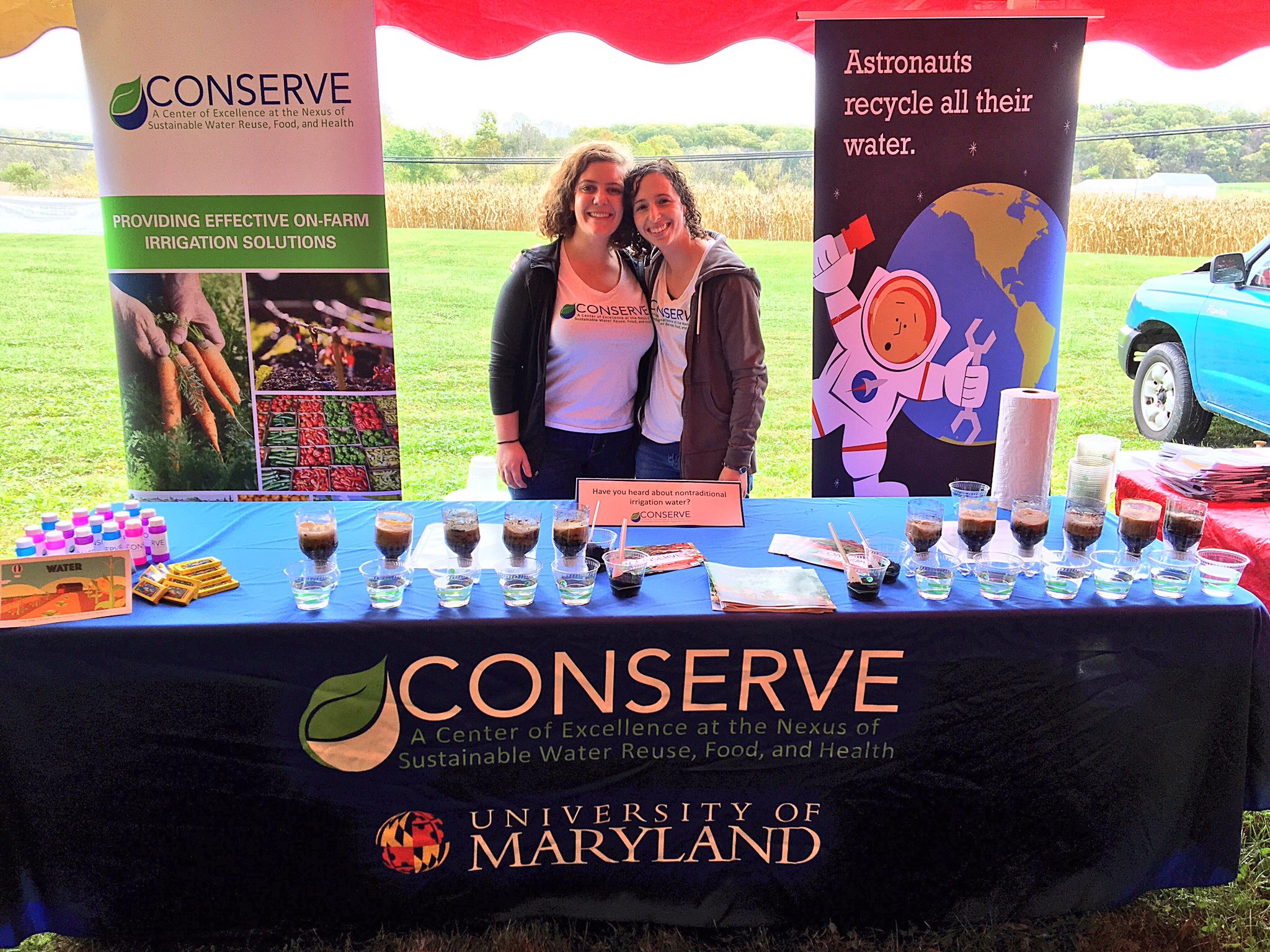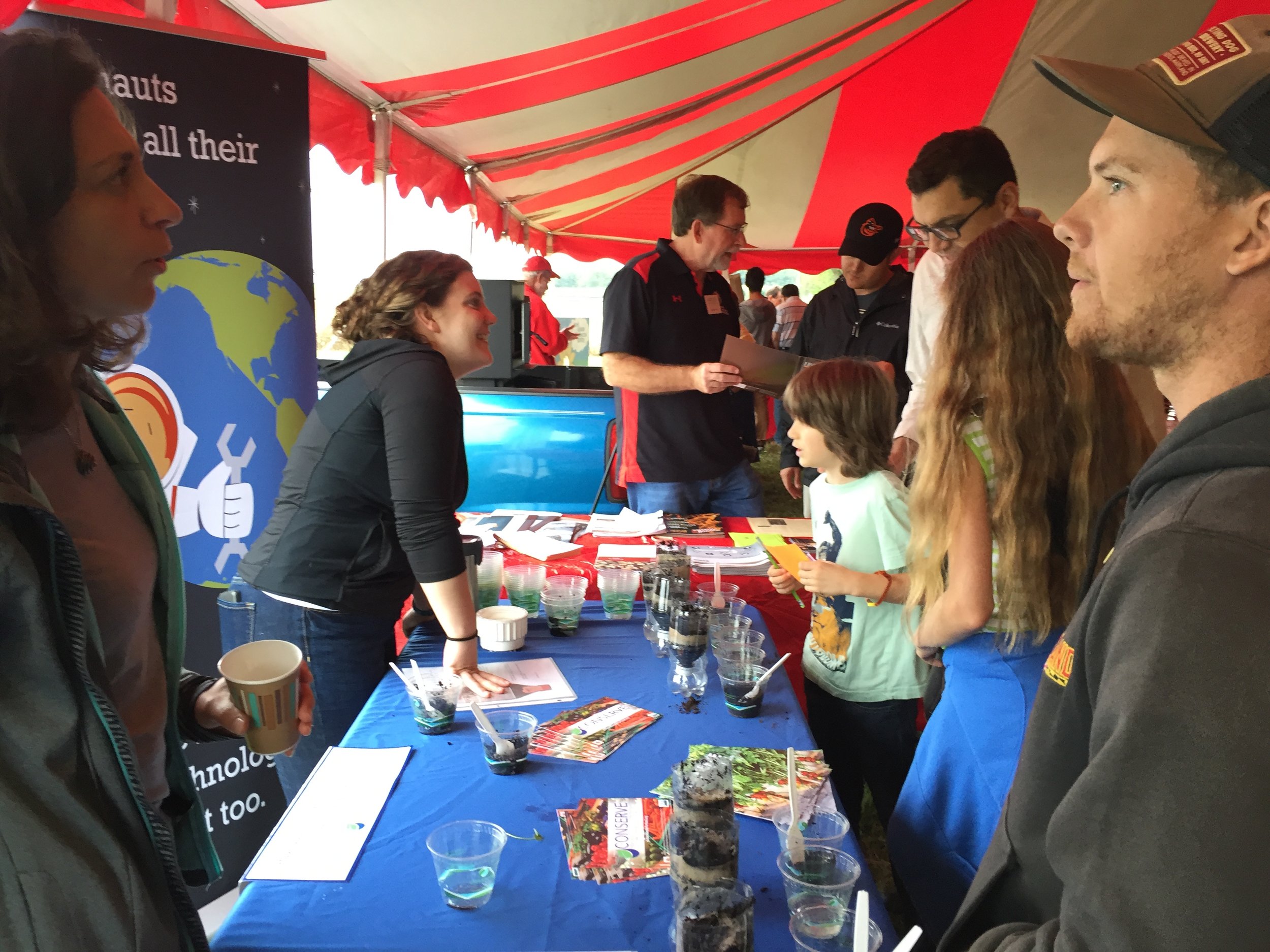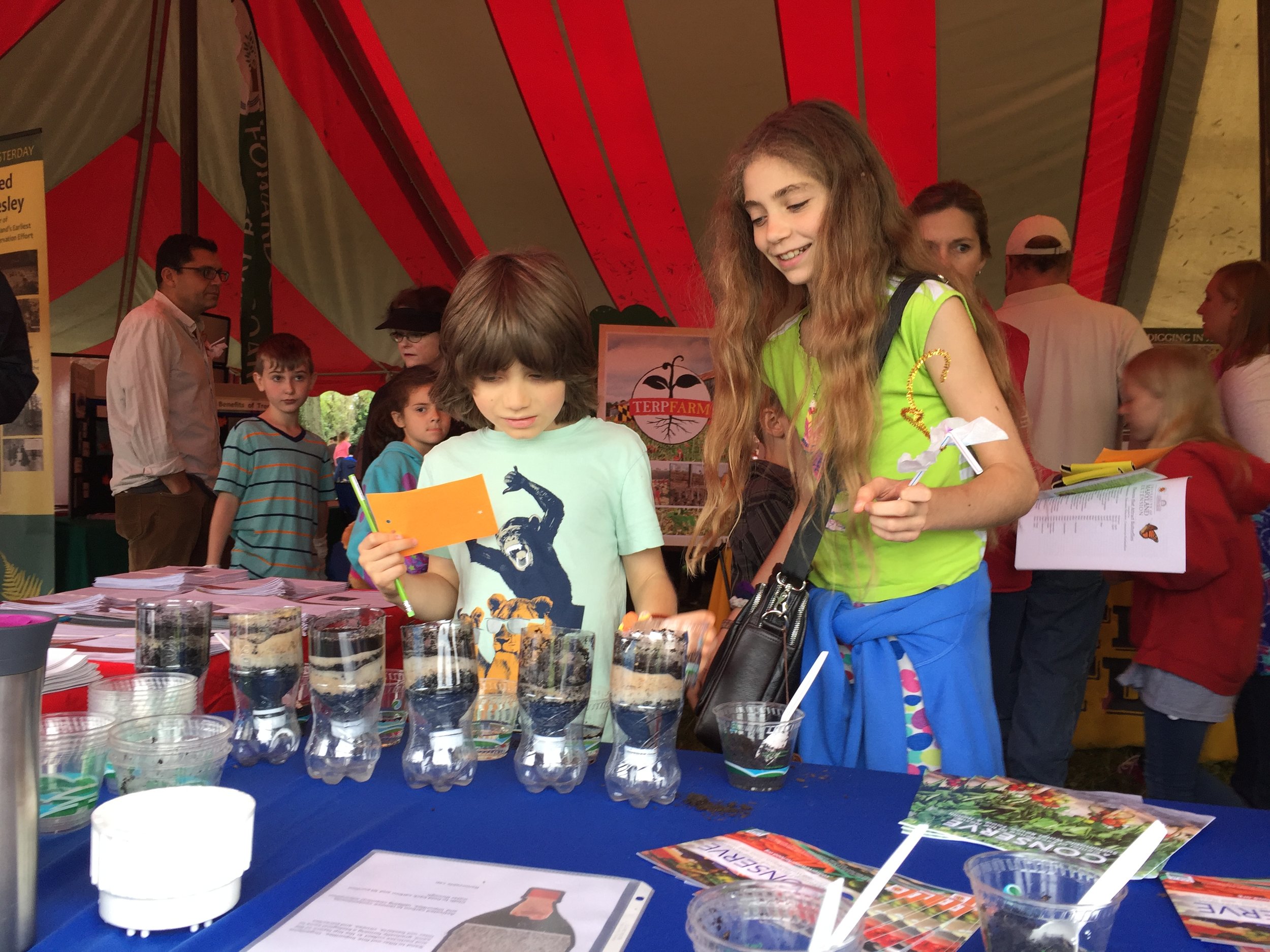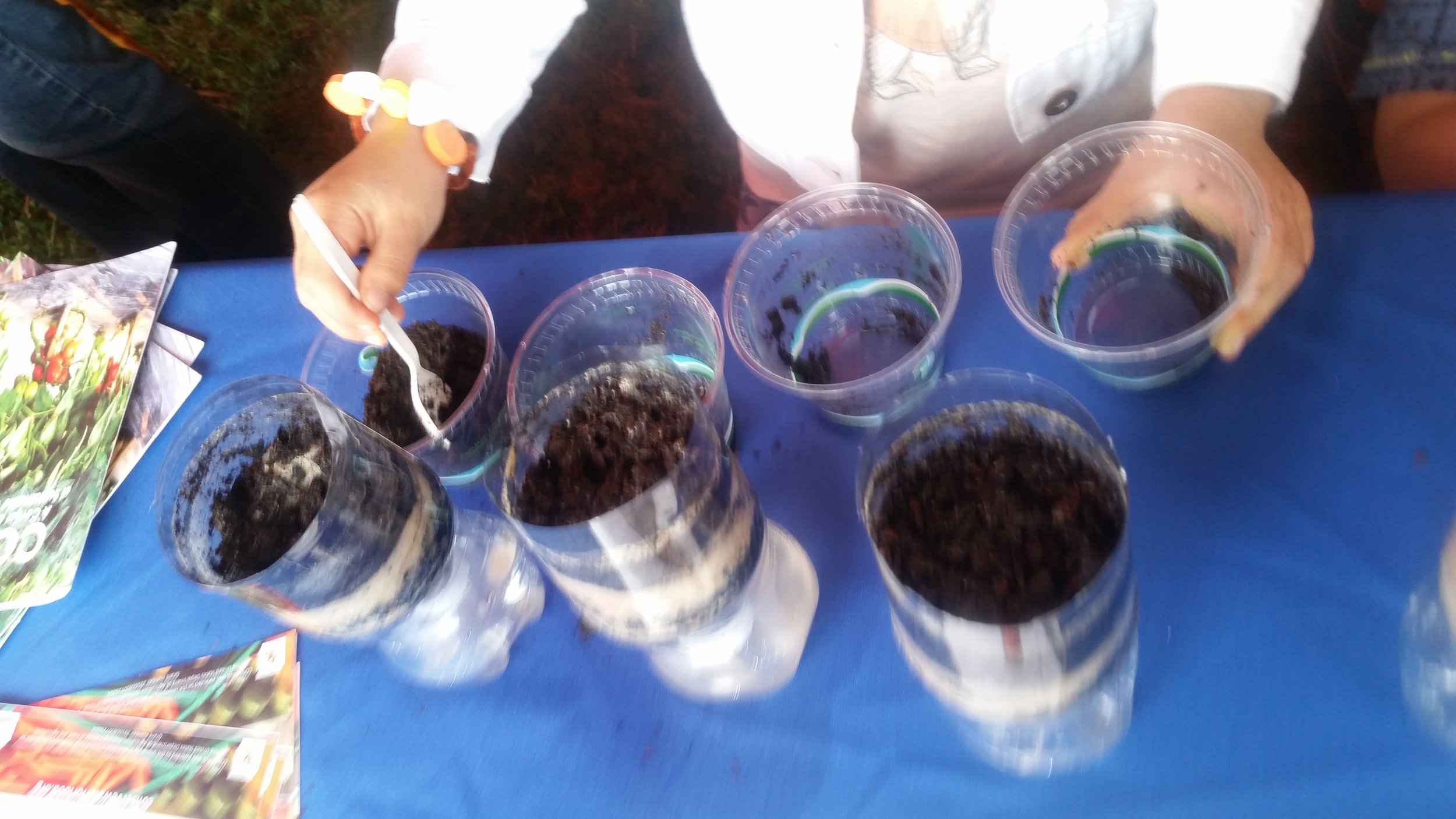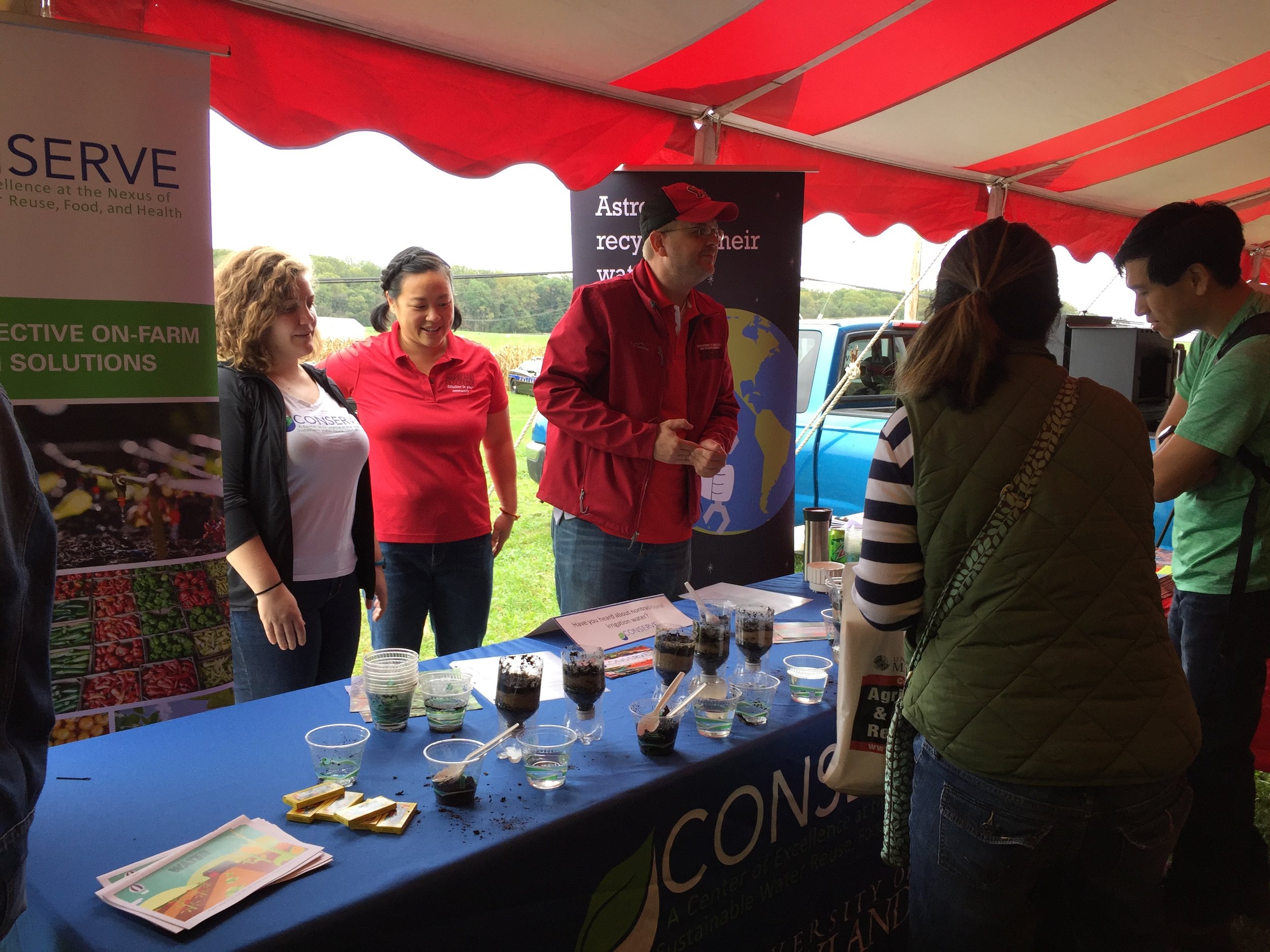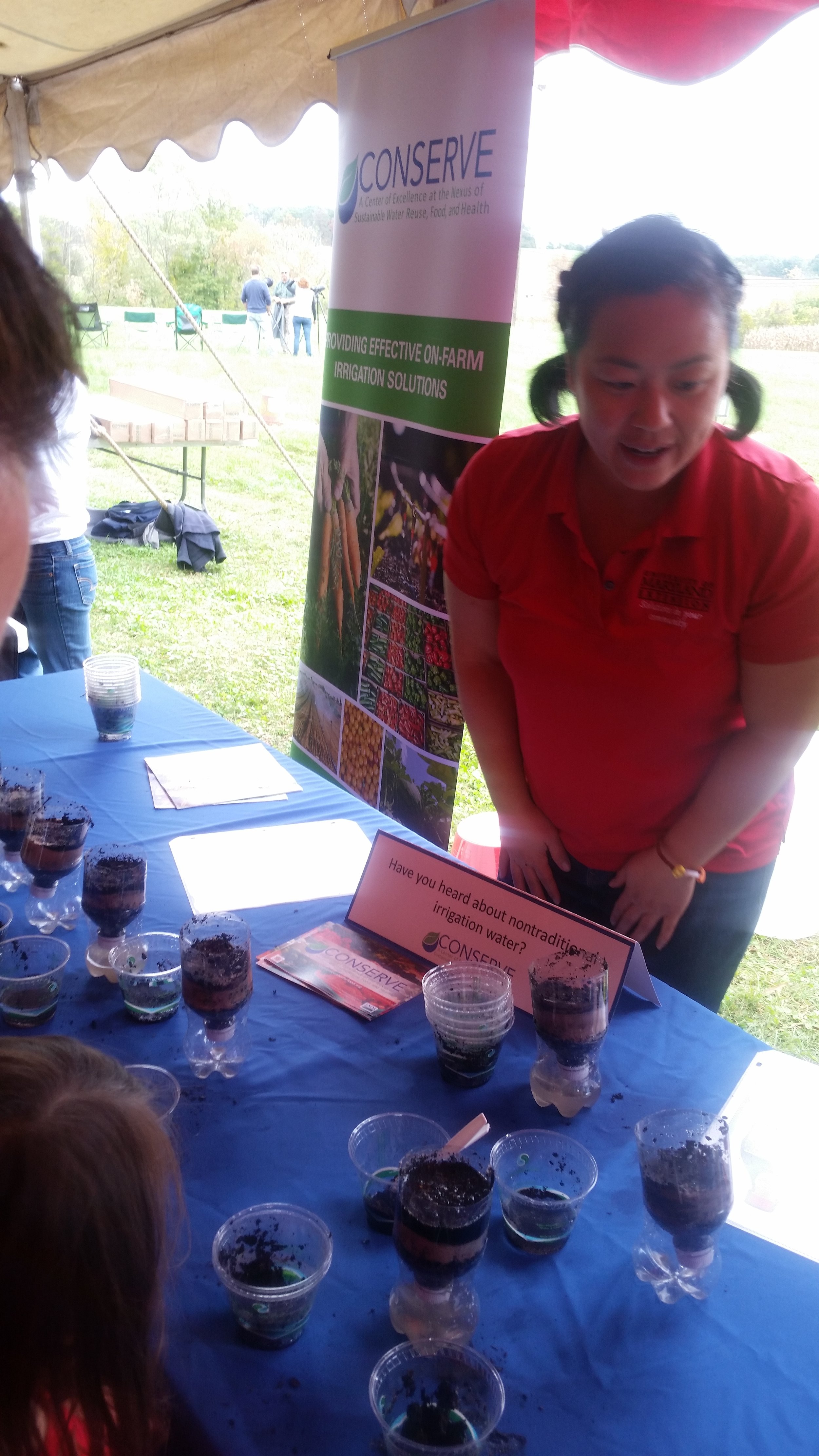CONSERVE Collaborator Dr. Clive Lipchin of the Arava Institute for Environmental Studies in Israel recently visited the Center for Judaic Studies at the University of Arizona to deliver a guest lecture. His talk, entitled “Water, Wastewater, and Energy Solutions for Off-grid Bedouin, Palestinian, and Jordanian Communities”, detailed the problems faced by the Bedouin people living in the Negev, including lack of access to basic services such water, sanitation and solid waste. The Arava Institute is piloting a program to develop an on-site, off-grid wastewater treatment and reuse system to treat and recycle grey water (kitchen and bathroom water) for irrigation and livestock watering in the Bedouin community. View Dr. Lipchin’s slides and a recording of his talk.
Have you ever wondered what CONSERVE has been up?
CONSERVE celebrated its one year anniversary in March 2017. Check out our annual report to see what we’ve been up to! From field sampling to consumer and grower surveys to development of new, innovative technologies, CONSERVE has been busy on its mission to facilitate the adoption of transformative on-farm treatment solutions that enable the safe use of nontraditional irrigation water on food crops.
Also check out what we’ve got planned for year 2, which will be filled with many new and exciting activities for the CONSERVE team. Don’t forget to follow us on Twitter and like us on Facebook for even more updates!
#CONSERVEwaterforfood
CONSERVE on display at the AGNR Open House
The CONSERVE project was on display at the UMD College of Agriculture and Natural Resources (AGNR) Open House on October 14th at the Central Maryland Research and Education Center in Ellicott City, MD. Held annually in the fall, the AGNR Open House draws a broad, eager audience from around the state, and displays research and projects related to the college. The CONSERVE team was on hand to teach adults and kids about recycled water with fun, interactive activities and awesome CONSERVE swag! Kids and adults got to make their own water filtration units to understand the importance of clean water, and kids got bubbles and coloring books to take home. See you next year at the AGNR Open House!
CONSERVE Scholars at SESYNC
CONSERVE Scholars* traveled to the National Socio-Environmental Synthesis Center (SESYNC) in Annapolis, MD to learn data analysis techniques and explore all the new and exciting datasets generated by the CONSERVE project.
CONSERVE Scholars at SESYNC in Annapolis, MD
*CONSERVE Scholars are graduate students, postdoctoral fellows and technicians who are conducting research under a CONSERVE activity.
CONSERVE@IAFP!
The CONSERVE Team is well represented in Tampa, Florida for the annual IAFP meeting!
CONSERVE @ the IAFP Annual Meeting 2017
The International Association for Food Protection (IAFP) Annual meeting will be held from July 9-12, 2017 in Tampa, FL. CONSERVE will be sponsoring an early morning breakfast on Monday July 10 from 7 AM to 8:30 AM in Rooms 8-9 of the Convention Center for networking and CONSERVE updates. All CONSERVE team members who will be at the IAFP 2017 conference are invited to attend the breakfast meeting. Please contact Dr. Kalmia Kniel at kniel@udel.edu for more information.
Save the date! CONSERVE's Annual In-Person Meeting 2017
Please save the date for CONSERVE's Annual In-Person Meeting at the University of Maryland, College Park, MD from August 3-4, 2017. More details to follow soon!
converse with CONSERVE
Celebrating our Scholars!
In this issue of converse with CONSERVE, we are celebrating just a few examples that indicate the many accomplishments of our CONSERVE scholars - the next generation of leaders engaged in sustainable water reuse on food crops. In our first year of CONSERVE, 61 CONSERVE scholars from 7 different institutions were supported by CONSERVE funds and worked toward CONSERVE goals: (20 Undergraduate students, 21 graduate students, 6 post-doctoral fellows, 14 technical staff). The CONSERVE Scholars have been "meeting" virtually each month, with presentations from individual scholars on their work so that the full team gets an overview of the work ongoing throughout the collaboration. Our CONSERVE scholars represent the full spectrum of our multidisciplinary team, including research, extension, and education. This summer, CONSERVE scholars from all activities will have the opportunity to participate in the National Socio-Environmental Synthesis Center (SESYNC)-sponsored CONSERVE Scholars Workshop, where they will use cyberinfrastructure tools for data discovery in food-water systems research, and get hands-on training in combining and analyzing existing data with primary data generated by the CONSERVE project. In addition, this June, we will have our first cohort of 7 CONSERVE undergraduate summer interns, who will be working with our co-Project Directors and their groups at the University of Arizona, University of Delaware, United States Department of Agriculture and the University of Maryland.
Keep reading below for some truly exciting and inspiring work of our CONSERVE Scholars.
• CONSERVE Scholars in Israel
In January of 2017, law students, business and economics graduate students, and public health post-doctoral fellows journeyed through Israel to study water reuse and learn about how the Arava Institute is working toward improving water access for communities in the West Bank. Funded in part by a grant from the University of Maryland Baltimore's Center for Global Education Initiatives and CONSERVE researchers, the participants drafted an informative report, "Greywater Feasibility in the West Bank: A proposal to commercialize greywater treatment systems with legal and health considerations". This report focused on the Arava Institute's efforts to incorporate sustainable water reuse technologies in the Palestinian territory and how strategies may be employed in off-grid communities in the region to improve water access and reuse.
• CONSERVE Scholars at Maryland Day
On April 29, CONSERVE Scholars at the University of Maryland engaged visitors to Maryland Day-the University's annual open house featuring family-friendly and interactive events. The CONSERVE booth included a do-it-yourself water filtration experiment, fantastic coloring book activities, a survey to identify consumer priorities of food and water choices, lots of CONSERVE swag, and "user-friendly" information about safe use of nontraditional irrigation water on food crops.
• CONSERVE Scholars at the United States Department of Agriculture, Beltsville Agricultural Research Center Poster Day
Congratulations to all of the University of Maryland and USDA Agricultural Research Service CONSERVE Scholars who presented their work at
the annual USDA BARC poster day. (Below: Sultana Solaiman from co-PD Shirley Micallef's lab presenting her first poster)
• CONSERVE Scholar invited to Lindau Nobel Laureate Meetings
University of Delaware CONSERVE scholar Sean Ellis (co-PD Kent Messer's lab) was selected to talk about his research and the CONSERVE project at the upcoming Lindau Nobel Laureate Meetings in Germany this August. Sean's work has been pivotal to examining consumer preferences for foods grown with traditional vs. nontraditional irrigation water sources.
• CONSERVE Scholars awarded 2017 International Association for Food Protection (IAFP) Student Travel Scholarships.
Congratulations to Hillary C. Kelbick and Rianna Murray for receiving 2017 IAFP Student Travel Scholarships. This competitive scholarship will support their travel to the IAFP meeting this summer in Tampa, Florida.
converse with CONSERVE
CONSERVE@1 year!
March 1, 2017, marks the beginning of Year 2 for the United States Department of Agriculture-National Institute of Food and Agriculture funded CONSERVE. CONSERVE's ongoing research, education, and extension efforts are developed with the goal of enabling the safe use of nontraditional irrigation water on food crops and effectively reducing the nation’s agricultural water challenges that are exacerbated by climate change. In the first year, the CONSERVE progress and accomplishments have been significant. To list just a few of the many highlights to date:
61 CONSERVE scholars from 7 different institutions supported by CONSERVE funds and working toward CONSERVE goals: (20 Undergraduate students, 21 graduate students, 6 post-doctoral fellows, 14 technical staff)
27 conference presentations by CONSERVE team members
9 articles published by or featuring CONSERVE team members
17 field sites sampled in the Mid-Atlantic and Southwest (3 water reclamation irrigation sites that utilize recycled water from municipal wastewater treatment plants; 3 vegetable/beverage processing sites that discharge wastewater/recycled water that could potentially be used for irrigation; 2 farms that are interested in using pond water for irrigation; 4 sites that are using non-tidal freshwater for irrigation; 1 site that is using tidal freshwater for irrigation; and 1 farm that is using tidal brackish water for irrigation; 3 wastewater treatment plants)
147 samples collected, processed, and purified and sent for 16S rRNA sequencing and/or metagenomic shotgun sequencing
1,400 adult subjects participated in five economic experiments examining consumer preferences for foods grown with traditional vs. nontraditional irrigation water sources
3 high level advisory panels established (the CONSERVE Advisory Committee, the Mid-Atlantic CONSERVE Extension Advisory Panel, and the Southwest CONSERVE Extension Advisory Panel)
9 CONSERVE scholars travelled to Israel to learn about the successful water reuse for irrigation policies and processes that the small, arid country has implemented to successfully transition from extreme water shortage to abundance
4 states researched to compile the existing laws detailing water reuse for irrigating food crops (Maryland, Virginia, Delaware, and California)
CONSERVE Year 2 plans are ambitious, including:
- The first cohort of CONSERVE Summer Interns (undergraduate students who will intern in CONSERVE-funded labs around the US)
- The first CONSERVE multimedia educational video
- The first CONSERVE scholars workshop
- The continuation of regular sampling schedules
- The continuation of consumer and grower assessment data collection and analysis
- The initial research to establish a laboratory-scale ZVI filter that can be implemented into a field setting
- Expansion of peer reviewed publications, conference presentations, and communications vehicles
- And much, much more
Go to conservewaterforfood.org for more information and updates.
CONSERVE Scholars in Israel
In January of 2017, law students, business and economics graduate students and CONSERVE scholars journeyed through Israel to study water reuse and learn about how the Arava Institute is working toward improving water access for communities in the West Bank. Funded in part by a grant from the University of Maryland Baltimore’s Center for Global Education Initiatives and CONSERVE researchers, the participants will ultimately draft a report for CONSERVE Collaborator Clive Lipchin and the Arava Institute that will focus on the Institute’s efforts to incorporate sustainable water reuse technologies in the Palestinian territory and how strategies may be employed in off-grid communities in the region to improve water access and reuse.
CONSERVE Economics Experiment in Israel
As an extension to the January Israel trip, led by the University of Maryland Francis King Carey School of Law, Environmental Law Program, CONSERVE Scholar Sean Ellis (from Kent Messer's group at the University of Delaware) collaborated with Dr. Clive Lipchin of the Arava Institute to survey the public on the Eilat promenade in Southern Israel. In just two days, the team collected 202 surveys, examining consumer preferences for foods grown with traditional vs. nontraditional irrigation water sources. These data are expected to initiate a more detailed, extensive study.




